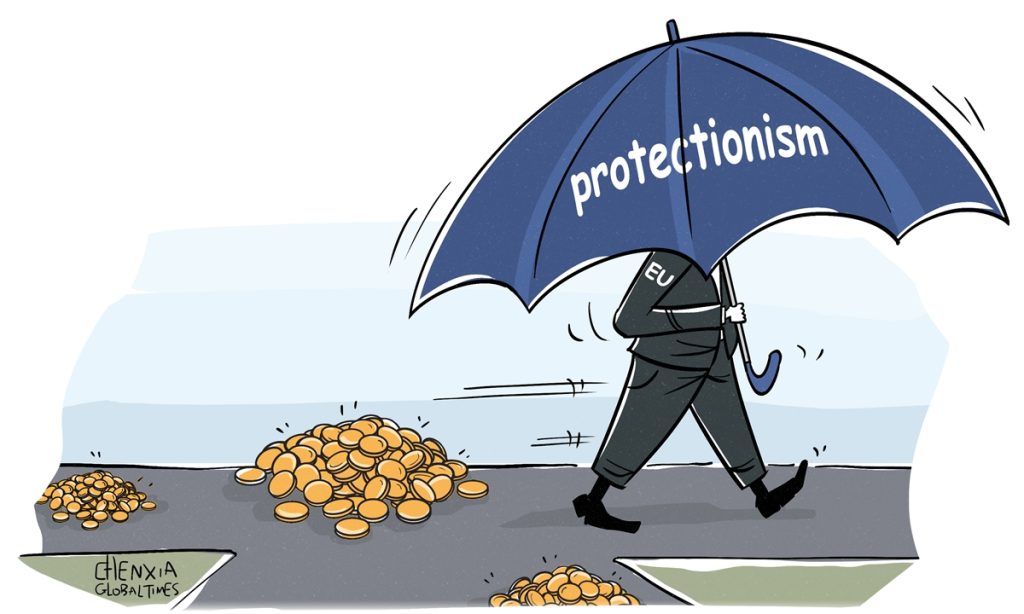Whether EU can ‘reduce perception of risk’ depends on its attitude toward protectionism

While EU's trade chief Valdis Dombrovskis urges China to do more to help "reduce the perception of risk," there are multiple signs that bilateral economic ties are embarking on fast-track development. Obviously, the European business community hopes EU's priority is to promote cooperation, rather than "de-risk" its relationship with China.
Amid global uncertainty, European and Chinese senior officials held high-level economic and trade talks on Monday. Despite some disagreements which are continually hyped up by some EU politicians, the high-level trade talks serve as a good opportunity for China and the EU to enhance communication and understanding.
Ahead of the dialogue, some statistics showed German companies continue to invest heavily in China despite calls from a number of German politicians to reduce their exposure in China. Investment in China as a share of Germany's overall investments increased to 16.4 percent in the first half of this year from 11.6 percent in 2022 and 5.1 percent in 2019, Reuters reported on Wednesday, citing data from the German Economic Institute, a private economic research institute in Germany.
Germany has been Europe's economic engine for decades. However, persistent inflation has pushed the German economy into a technical recession with data showing that the economy contracted in the first quarter of 2023. Overall, German direct investment outflows dropped sharply, to 63 billion euros ($67 billion) in the first half of 2023 from 104 billion euros in the first half of 2022.
At a time when Europe's largest economy is battling recession, the Chinese economy offers opportunities for German enterprises. That's why in spite of the so-called decoupling or de-risking rhetoric made by some Western officials, European investments continue to pour into China.
It is worth noting that there is a trend that the more open China becomes, the more vigilant the EU has become against China. It is true that economic and trade disputes exist in China-EU relations. The European Commission launched an investigation on September 13 into whether to impose additional tariffs to protect EU producers against cheaper Chinese electric vehicle (EV) imports it says are benefiting from the so-called state subsidies. Trade protectionism could be a double-edged sword for bilateral relations, as China is now an important overseas market for European enterprises.
Dombrovskis said in a speech he delivered at Tsinghua University in Beijing on Monday that Europe's economic ties with China are deep, but China "could do a lot to help reduce our perception of risk," according to a Reuters report. The report said the EU has long complained about "a lack of level playing field in China" and "the politicization of the business environment," which is mainly a Western narrative to sow discord and to pressure China to give foreign investors supernational treatment.
As a matter of fact, Europe is the party that adopts protectionist measures to disrupt economic and trade cooperation. China welcomes investment from European countries, but the ball is in the European's court to break down barriers over mutually-beneficial economic cooperation. The best way to help reduce European perception of risk is to put geopolitical thinking aside, stop adopting protectionist measures, fully consider the feelings of European companies, and resolve each other's concerns through dialogue and consultation.
Monday's dialogue, the first in-person meeting post-pandemic, has drawn wide attention. It's impossible to solve each and every problem overnight, especially amid the "decoupling" calls and the instigations by the US, but achievements will add up through frank dialogues and communications, pushing forward China-EU economic ties.
Monday's trade talks won't become the endpoint for both sides to seek common ground and solutions to resolve differences and problems. Future efforts should be made and the European side should take more responsibility, as it is the party bowing to trade protectionism. Whether it can "reduce the perception of risk" depends on Europe's attitude toward trade protectionism.